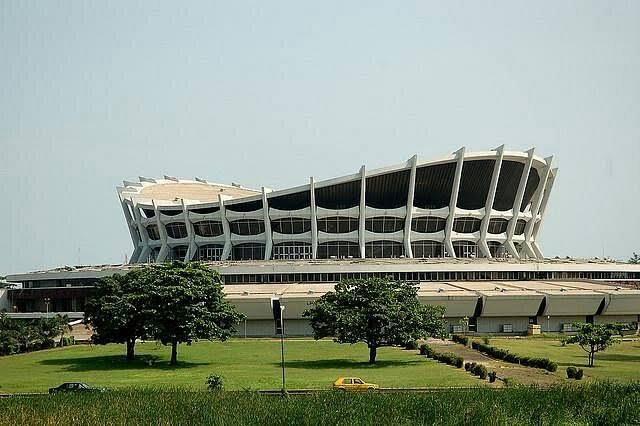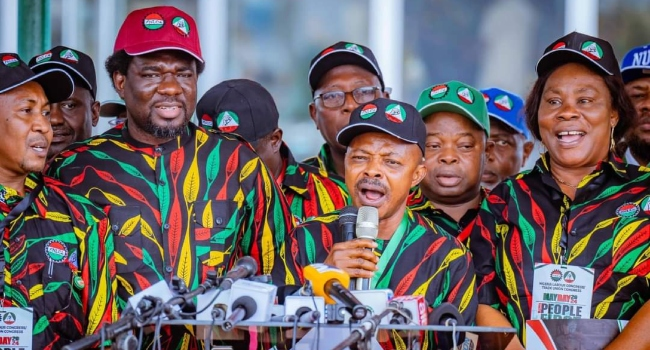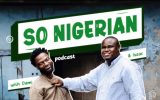.
by Ifeanyi Emeka
When Soyinka’s publisher, Bookcraft Africa, announced the forthcoming publication of his third novel on October 2020, almost 50 years since ‘Season of Anomy,’ his second novel published before ‘The Interpreters’ in 1973, the reactions in the literary sphere were joyous amid simmering stereotypes of a renowned writer known for his elevated choice of literary language suited for an esoteric class rather than the common readers.
Like ‘Seasons of Anomy,’ Soyinka returns to the centered narrative of four characters who largely permeate the plot of his novels. In Chronicles of the Happiest People on Earth, ‘a four-headed conjoined Benin Bronze’ will define the foursome friendship of Duyole Pitan Panya, a dedicated engineer; Menka Kiaghare, a surgeon; Badetona, a corporate finance trainee; and Farodion, a dreamy artiste who became Soyinka’s intriguing character of mayhem.
Do we call him Papa Davina? Maybe he is not Davina, formerly Dennis Tibidje, the Gardener of Souls, one whose perspective is informed by dubious exploits and a mobile modernity of places, will arrive at the Nigeria religion of the moment, the Church of Ekumenika! A religion that’s had its pride of shame rooted in a desperate dalliance of greed, deception and politics.
The Nobel Laureate’s work is a story of a nation whose failures have become chronicles of sadness masked in gaiety. We are suffused in the happiness of survival only as far as we find comic relief in religion, wealth and political privilege.
The characters, Sir Goddie and Chief Akpanga’s in-house party tussle is the news of countless defections of politicians from one party to another; the newsworthy factions among party stalwarts within top political parties.
Anyone familiar with the news will applaud Soyinka’s memory for giving the ridiculous an imaginative playground. Laughable dialogues of unmanned ignorance splayed with the watery wisdoms of Nigerian politicians, a reaction that has become twitter-unhinged by citizens who bemoan the insanity of her leaders.
Dr. Kiaghara Menka knows that a failed nation has its ‘nightmares;’ they are the hypocritically privileged citizens who feign knowledge of the state of the nation in their lifestyles and complacency of comforts. Hence Menka’s rage at one such gathering: “All of you, what have you seen? I said, where do you all live? Hypocrites! You’re part of the nightmare. And I’m sick of listening to all these pointless babble.”
Oftentimes, Soyinka believes that the readers know as much as he does and so he dares digressions, writing in sentences laced in tonal polemics.

The devious world of human body part dealers, enabled by Nigerian medical practitioners will force Menka to seek a change, “Quit the job. Quit the position. Even the profession.” Kiaghara had a history of compromising in the early days of his profession, but he felt his defence were clear “Law and ethics often clash. That comes to all of us, sooner or later, and in the medical profession most often.”
The conversation will morph into the continuous sordid existence of colonialism, medical malpractice, the civil war and regional ideologies.
The old and new world are paired, far away from religion as a conduit of mayhem. Sarcasm is thrown at national and political honours doled out on frivolities and party favouritism. Sir Godfery Danfere and his image maker, Merutali reinforce the narrative that we are not devils until we embrace politics.
Despite Soyinka’s disgust for creatively named and abbreviated awards doled out to incompetent leaders, he still sees the honesty of a few individuals who merit these national awards.
To keep sane in Nigeria as one character quipped is to exercise “gallows humour” amidst the sufferings, pains and deaths of others. It is, as this character insists, ” good for digestion.”
There is courage and rage in this intriguing political saga. Soyinka, in a language that evades simplicity, reminds readers that words unused permit incomplete description. Nothing seems beyond description to the Nobel Laureate. A polysemous flavouring of words fused to concretize meaning is expendable poetry, the language of art, the joy of reading. Soyinka aims for these and more: to exhaust truth with every permissible diction. Hence the concept, ‘Civilian Demonism.’
Every reader will find a story, a familiar character and a factual Nigerian depiction that chronicles her unhappiness with a nation plundered by the actions and reactive policies of its political class.
The irony of a ‘happy citizen’ is that privilege doesn’t inoculate you from the tragedy of the masses. Your unhappiness is squared to the degree of your comfort. Wole Soyinka’s refutation is honest – an unhappy Nigerian is the only Nigerian.
In an era of amnesiac truth alongside a rise in fake news, fiction restores the dignity of facts for the preservation of timeless memories unalterable in its insistence on functional truth. ‘Chronicles of the Happiest People on Earth’ is news as fiction for the humane preservation of an unfazed terrible era in our nation’s political history.
In reading the novel solely around three of the ‘Gong’o Four’ friends, one imagines the author careless or forgetful of Farodion, the artist. Indeed not. Soyinka draws us into the concrete belief that privileged elites are the orchestrators of national mayhem.
But who is the pseudo absent Farodion in this astonishing work? How did the complex unravelling of a code make betrayal by friend and blood possible? Only a master of plot twists like Soyinka knows better.
Soyinka’s Chronicles is a novel on familial complexities and betrayal, patriotism, friendship, and the coalescent powers of politics and religion.
Wole, is our brave conscience of artistic truth. These remarkable chronicles have succeeded at banishing tales of inventions for events familiar to us by a writer whose voice and presence is a potent vestige of hope and sanity.
If this is his last fictive offering, it will be an unpunishable crime, although there are many more unchronicled narratives of our unhappiness.














